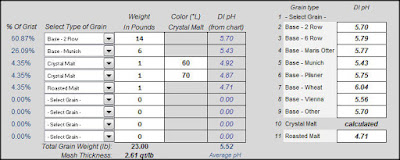 |
| ezBrewingWater-RO© - The easy way to perfect brewing water! |
RO and distilled water have extremely low alkalinity and they are devoid of salts and minerals. They both make the ideal water source to use when creating brewing water profiles that are perfect for any style of beer. ezBrewingWater-RO© makes it easy to choose just the right amount of salts and minerals needed to season brewing water to suite your taste. Adjusting the pH of your brewing water so that the mash stays within an optimal pH range, based on the type of grains used in a recipe, has never been easier to do. ezBrewingWater-RO© is the easy way to perfect brewing water!
Download ezBrewingWater-RO© Now!
Homebrewers already know that water is the single largest ingredient used in the beer that they brew. Many have heard it said, or possibly read somewhere that "If your water tastes good, you can brew good beer with it" and yes, of course, that makes perfect sense. But what exactly is in water that makes it 'taste good' and what enables it to make 'good beer'? After all, the water piped into your home today looks and tastes just fine. It contains no sediment, it is sparkling clear in a glass and it tastes good; even if it were to have a slight chlorine aroma. Water like this should be perfect for brewing a 'good beer' right? The simple answer is no, at least not by today's homebrewing standards.
| Enter The Volume Of Water To Be Treated |
ezBrewingWater-RO© was created to be used with reverse osmosis, commonly known as RO water, or distilled water. Both types of purified water, RO, and Distilled have been stripped clean of any salts, minerals and other impurities that the source water contained. The water produced by either process has extremely low alkalinity, is devoid of salts or minerals and makes the perfect base water to use when creating any brewing water profile. RO and distilled water are both inexpensive to use and are readily available to buy in many local stores.
 |
| Enter The Grains That Are Used In The Recipe |
The flavor and alkalinity of RO water can be restored by replacing measured amounts of salt and mineral content that were stripped away during filtration. Adding measured amounts of gypsum, calcium chloride, Epsom salt and Baking Soda to RO water also adjusts the sulfate to chloride ratio of your brewing water; making it more suitable for any style of beer. The pH level of your mash water can be raised by adding Baking Soda or it can be lowered by adding Lactic Acid, or the mash itself can be lowered by the addition of acidulated malt directly in the mash.
The type of grains used in a recipe determines the acidity of the mash, darker more acidic grains will lower mash pH much more than lighter grains such as 6-Row and wheat. To achieve the best enzyme activity and conversion of starch to sugar the recommended mash pH range is between 5.3 and 5.5 at 77F. Wort produced using a water profile that keeps the mash pH within this range, or 5.1 to 5.3 at mash temperatures, also helps to enhance the performance of yeast during fermentation while discouraging the growth of bacteria.
 |
| Enter The Amount Of Salt, Mineral And Acid To Match Your Beer Style |
Homebrewing combines the art of recipe creation with the science of brewing, including the science of water chemistry. Throughout recorded history, the most famous styles of beer originated in unique geological locations. Two prominent styles that come to mind are Kölsch from Cologne, Germany and Dry Irish Stout from Dublin, Ireland. The soft waters of the Cologne Basin give Kölschbier its authentic soft mouth feel while the hard, alkaline waters of Dublin, Ireland accentuate the dry creamy mouthfeel of Stout.
 |
| Review The Calculated Water Alkalinity And Mash pH Values |
Now that all traces of chlorine or chloramines have been removed the brewing water is perfect for brewing a 'good beer' right? Yes it is, but unfortunately, it is not good enough to brew a great beer. Great beers are brewed using water that has the just the right levels of salts, minerals, alkalinity, pH and a few other important properties. The improvements needed to turn good brewing water into great brewing water requires the use of some very powerful chemistry formulas. A water chemistry calculator like ezBrewingWater-RO© lets you focus on creating the perfect water profile for your next beer without having to worry about the complex chemistry that is involved.
Acknowledgements:
If it were not for the pioneering spirit of visionaries such as John Palmer, Colin Kominski, Kai Troester, AJ Delange and Martin Brungard, brewing water calculators like ezBrewingWater-RO© would not be available to the homebrewing community today. Their tireless dedication and commitment, to applying the laws of science and water chemistry to homebrewing, has given rise to the immense popularity and the superior quality of homebrewed beer.

Thanks for this excellent tool, Vince! I had one question: the numerical values on Tab 2 / Water Profiles appear to represent additions in grams. Is this based on a 5 gallon batch? I'm trying to add my own profile and want to understand the basics on this tab.
ReplyDelete